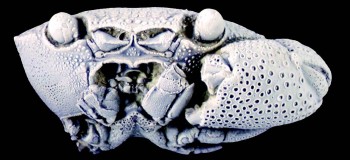Invertebrate Fossils Go Digital, Get Adopted
October 23, 2015

Climate, Carbon & Geobiology
Over the past hundreds of millions of years Texas has been home to a menagerie of now extinct creatures, from trilobites to sea lilies. The Jackson School of Geosciences Non-Vertebrate Paleontology Lab (NPL) is improving the on-site and digital preservation of its over four million specimens from Texas and elsewhere thanks to a successful “Adopt-a-Fossil” fundraising campaign and a grant from the National Science Foundation (NSF).
The fundraising money will be used to buy a 3-D laser scanner and to support the scanning of 25 specimens that represent the major branches of invertebrate life, such as corals, sponges, mollusks, arthropods and echinoderms. Supporters will receive gifts related to their adopted specimen, such as a certificate of adoption, a glossy print of their fossil and a 3-D printed model of it, depending on their level of contribution.
The NSF grant will fund more 2-D and 3-D specimen scans, as well as the development of a digital interface so people can access images of the scanned specimens and other related data online. The NPL is collaborating with researchers from the university’s Texas Advanced Computing Center to design the interface. The grant also covers upgrades to NPL facilities, such as improved archival cabinets for specimens.
“It’s a combination of improved physical and virtual accessibility,” said Ann Molineux, curator and collection manager of the NPL, about the NSF grant.
The fundraiser exceeded its goal of $15,000, raising a total of $17,119. The NSF grant will provide the lab with $495,880 over three years.
Back to the Newsletter